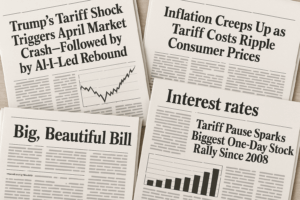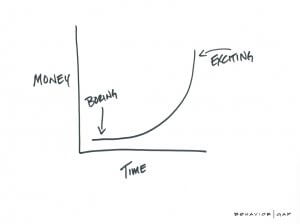
The Influencer Effect
Investment ManagementApr 23, 2021
If we fast forward ten or twenty years into the future and look back on the current market environment and investor behavior, what will we say? How will financial history remember this moment in time? I have no idea, but it certainly will make for some interesting stories for people who lived through it, and some good books for those who didn’t.
Nick Maggiulli summarized it well when he said in a recent article titled “The Craziest Market I’ve Ever Seen”: “Currently, we have an antiquated video game retailer (GME) being valued at $10 billion (nearly 10 times what it was worth at the start of the year). A joke electric car manufacturer (Nikola) has a price-to-sales ratio near 10,000 and is still a multi-billion-dollar company. We have a literal joke internet coin (Dogecoin) that has a market cap of over $50 billion…I could go on but you get the point.” To add some context to that last one, that means a satirical internet coin with no actual use is worth more than Ford Motor Company. What is going on?
A lot has been written about the “gamification” of markets through products designed to feel more like a video game or gambling app than an investing tool (looking at you Robin Hood). While that is no doubt the case, I’d argue that just as big an impact on investor behavior over the last year has been what I will call the “influencer effect”. Social media influencers still make me scratch my head, but you can’t argue with their effectiveness. The goal is followers, likes, and clicks. If you can get people to do that, you can monetize them one way or another. Never before have you been able to reach so many people and get them to buy what you’re selling so easily. The attention economy, as it is often referred to, has made its way to investing world and it’s being led by celebrity “influencers”.
Elon Musk, Mark Cuban, Snoop Dogg, Dave Portnoy and people on Tik Tok I am too old to know by name have mobilized their massive social media followings to invest and speculate in everything from cryptocurrencies to stocks to new IPO’s. Rob Gronkowski and Paris Hilton are peddling NFTs. These are just a few examples of celebrities pitching “can’t miss” opportunities to make money quickly.
Then there is the SPAC madness. These are companies that go public with no operations and no earnings. They exist to raise money, and then buy/merge with a private company. There were so many SPACs being promoted by celebrities that the Securities and Exchange Commission (SEC) actually had to issue an alert to investors about their risks. “It is never a good idea to invest in a SPAC just because someone famous sponsors or invests in it or says it is a good investment”. That sentence seems like it belongs in Saturday Night Live’s “Weekend Update”, but I copied it verbatim from the SEC notice.
In 2021, getting attention is the thing that matters most in investing. That seems to outweigh anything else (for now at least). Social media and lockdown boredom have been a dangerous combination. Throw in ultra-easy access to credit from the Fed along with cash from stimulus checks, and you’ve got a recipe for a wild party. All of this has led to investing as a form of entertainment, with celebrity influencers as investment salespeople. There are a couple things to remember regarding this development:
1. The influencers who are driving these frenzies, while perhaps non-traditional, are no better or worse than any prior self-proclaimed “investment gurus” and salespeople who made money selling good stories. They have been around for as long as markets have. It just a new messenger, a new way of marketing, and a new shiny package
2. They’re not doing it out of the goodness of their hearts, they all have a financial incentive to push whatever it is they are selling (whether they make that clear or not)
3. This could go on for a while, but chances are it’s not going to end well for many people
4. The celebrity influencers pitching this stuff won’t be the ones who lose money
This is really just the latest twist on a common pattern of human behavior: We underestimate what is important if we find it boring, and we overestimate the importance of what we find exciting. We don’t want to talk about better ways to save, pay down debt, and play the long game when investing. The short game sounds a lot easier and more fun. That doesn’t just go for investing either. Look at personal health as an example (and there are a lot of examples). If people and companies had incentives aligned more towards “boring” things like balanced diets, exercise, and other preventive measures we’d probably be healthier. Instead, much of the focus goes towards developing the next best magic pill and starting the latest fad diet. It’s not that these things always happen due to bad intentions, it’s just human nature. We want the exciting thing that happens quick, not the boring thing that takes time.
Now, going back to viewing all of this through the lens of history. No matter what period of time you are looking at, the same principle holds true: when everyone’s attention seemed to be focused on all the easy and exciting ways to get rich quick (often being sold by charismatic people), it was usually a good time to proceed with caution.
Citations
The Craziest Market I’ve Ever Seen, Nick Maggiulli- Of Dollars and Data, April 19, 2021
Dogecoin, Once a Joke, Moves Mainstream, Caitlin Ostroff and Caitlin McCabe- Wall Street Journal, April 19, 2021
How the Stock Market Works Now: Elon Musk Tweets, Millions Buy, Jason Zweig- Wall Street Journal, February 12, 2021
These celebrities are bringing NFTs to the mainstream — and cashing in, Julia Gray, March 9, 2021
Celebrity Involvement with SPACs – Investor Alert, Securities and Exchange Commission, March 10, 2021
Obvious Things That Easily Escape Attention, Morgan Housel- The Collaborative Fund, February 28, 2018


